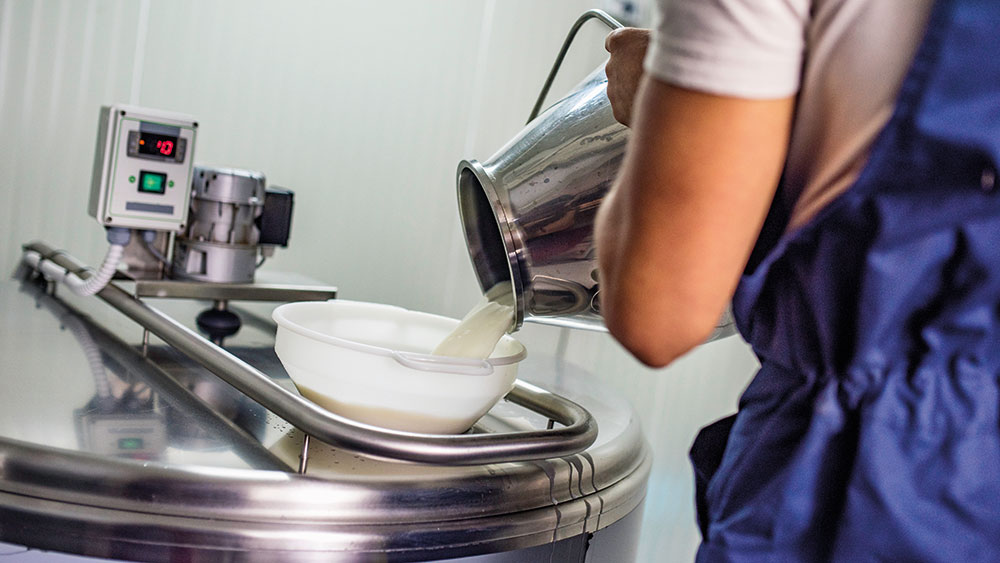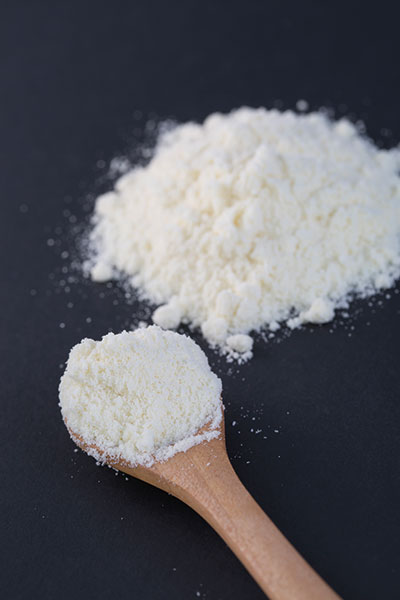LAB-work: the benefits of fermented milk

There are a number of potential gut health benefits associated with the fermentation of milk using lactic acid bacteria (LAB), which can be accessed in powdered form.
It has been widely reported that fermented foods – for example fermented milk – have a range of health benefits, such as anti-inflammatory, anti-hypertensive and anti-cholesterolaemic properties. These benefits are attributed to the live microorganisms present in fermented foods, as well as the compounds that the microorganisms produce (known as bioactive metabolites) during the fermentation process of a given substrate.
Consuming fermented foods is not the only way to unlock these benefits, however. Fermentates (a term used to describe the powdered preparation of a fermented product) can also provide improvements to our health; and yet, reports on the benefits of fermentates are not as common.
Fermentates typically contain some combination of live or heat-inactivated microorganisms, cell surface components of these micoorganisms, pre-digested nutrients and bioactive metabolites. To test their effectiveness, researchers at Teagasc conducted a series of studies using milk-based fermentates.
Studying bacterial populations in faeces
The researchers used skimmed milk and fermented it with individual bacterial strains belonging to the lactic acid bacteria (LAB) group, a class of bacteria commonly involved in the fermentation process of dairy fermented foods. They then heat-killed the LAB strain.
Next, the milk-based fermentates were added to faecal samples obtained from healthy volunteers, in order to rapidly test their impact on microbes in the human gut.
Harsh Mathur, Teagasc Research Officer, says: “The aim of our study was to investigate if dairy fermentates produced by individual LAB strains have the potential to confer gut health benefits. To do this, we used a ‘faecal fermentation’ model system involving the microMatrix bioreactor platform in the laboratory, to mimic conditions found in our colons.”
Faecal samples contain thousands of bacterial species, some of which are considered ‘friendly bacteria’, while others are associated with ill-health and disease. The researchers added the powdered skimmed milk fermentates to the samples, and screened them to see what effect they had on the bacterial populations in the faeces.
“We were interested in seeing if the fermentates caused the populations of friendly bacteria and
disease-causing bacteria in the faecal samples to increase or decrease,” explains Harsh. “We compared all the fermentates to standard, non-fermented skimmed milk, which acted as a negative control in the experiment.”
 A boost to gut health
A boost to gut health
The researchers’ faecal fermentation studies are ongoing, but they have already obtained some promising preliminary results. Several milk-based fermentates have demonstrated the potential to elicit gut health benefits by increasing friendly bacteria – such as Bifidobacterium and Lactobacillus – typically associated with good gut health.
As the milk-based fermentate powders contain heat-inactivated LAB strains, the researchers believe that any gut health benefits associated with the fermentates is linked with the bioactive metabolites that are produced during the fermentation process, as well as the components of the cell surface of LAB strains.
“We’re encouraged by the promising effects of the LAB dairy fermentates with regards to their ability to increase populations of friendly gut bacteria,” says Harsh. “However, we don’t currently have insights into which bioactive metabolites are responsible for such positive effects.
“To address this, we’re collaborating with researchers at University College Dublin to delve deeper into the actions of these fermentates and identify the specific bioactive metabolites that are present in them. At the same time, collaborators at University College Dublin and Dublin City University are testing the anti-inflammatory and pro-inflammatory effects of the fermentates.”
The researchers hope to collate the data and come up with comprehensive insights into which of the LAB dairy fermentates have the best overall gut health benefits. The team also hopes to test large-scale amounts of these powdered fermentates in human trials, where a number of volunteers will consume them over a period of time.
It is hoped that the promising gut health benefits seen in the researchers’ lab experiments will translate to good gut health effects in human trials.
FUNDING
This work was funded by Food for Health Ireland (FHI). Research in Paul Cotter and Tom Beresford’s laboratories is supported by Science Foundation Ireland (SFI) Centre for Science, Engineering and Technology, APC Microbiome Ireland, FHI, VistaMilk and the Department of Agriculture, Food and the Marine.
Acknowledgements
The contributors of this article would like to thank Teagasc researcher Cathy Lordan and former Teagasc researcher Chloe Matthews for their contribution to this research.
[pic caption] The researchers used skimmed milk and fermented it with individual bacterial strains belonging to the lactic acid bacteria (LAB) group before heat-killing it
